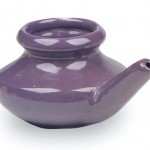If you are a sufferer of seasonal allergies, then you are familiar with itchy red eyes, stuffy nose, sneezing, and the fatigue that often goes with it. Fortunately, there are a great number of natural remedies available that can help manage. Once allergy symptoms have kicked in during a given season, treatment will focus first on getting immediate relief. However, during periods of ‘remission’, ie outside of allergy season, treatment can aim directly at treating some of the potential underlying causes of allergies. There is significant evidence to connect digestive issues with respiratory allergies (1)(2)(3) This is not surprising since the majority of our immune system is found within the gut, and seasonal allergies are generally an over reaction by the immune system. Therefore, in patients with poor digestive health such as IBS, bloating, gas, constipation, addressing these issues may also help reduce and prevent allergy symptoms. Possible interventions for this could include herbal therapies, probiotics, supplementation with zinc, glutamine, or other supplements beneficial to the lining of the gut.
Other factors may also play a contributing role in the development or worsening of allergies. According to research published by the Mayo Clinic, individuals with chronic sinusitis are likely to have fungal infections in the sinuses (4). So, treatment to resolve this issue could certainly play an integral role in improving sinus health for some patients. Of course, there may be a wide variety of other factors contributing to a person’s seasonal allergies. This can be determined more precisely during a patient visit.
Whether a person chooses to address these underlying issues or not, symptom relief during allergy season is something our patients always appreciate. There are a number of herbal formulas which effectively reduce symptoms such as stuffy nose, sneezing, itchy eyes and fatigue. Which herbal product is best depends on the specifics of each individual. Some people may have significant itching and redness of the eyes, while another person may suffer more from sneezing and sinus pressure.
One of the most common products used for seasonal allergies is Pe Min Kan Wan (Nasal Allergy Pills). It contains herbs which are antihistaminic, anti-inflammatory, as well as herbs traditionally used for red irritated eyes. For individuals who experience not only stuffy nose, but also allergy headache, a classic time tested formula, Xin Yi San (Magnolia Flower Powder) often alleviates symptoms very effectively. A common supplement which research indicates can reduce allergy symptoms is quercetin, a commonly occurring bioflavonoid (5). Quercetin is actually plentiful in a healthy diet, as it occurs in foods such as onions, grapes, tea, and many vegetables such as broccoli; one more reason why eating plenty of fruits and vegetables is health promoting. Additionally, quercetin may be beneficial for those who suffer from allergy induced asthma (6). If you, or someone you know, deals with seasonal allergies, there are an abundance of natural therapies which may help. Simply call and set up an appointment here at the clinic to discuss which options will work best for you.
1)EBioMedicine. 2015 Nov 27;3:172-9. doi: 10.1016/j.ebiom.2015.11.038. eCollection 2016
2)Annals Am Thorac Soc. 2016 Mar;13 Suppl 1:S51-4. doi: 10.1513/AnnalsATS.201507-451MG
3)Curr Opin Rheumatol. 2015 Jul;27(4):373-80. doi: 10.1097/BOR.0000000000000191
4)Mayo Clinic. “Mayo Clinic Study Implicates Fungus As Cause Of Chronic Sinusitis.” ScienceDaily. ScienceDaily, 10 September 1999.
5)Molecules. 2016 May 12;21(5). pii: E623. doi: 10.3390/molecules21050623 6)Int Immunopharmacol. 2009 Mar;9(3):261-7. doi: 10.1016/j.intimp.2008.10.021. Epub 2008 Dec 4
6)Int Immunopharmacol. 2009 Mar;9(3):261-7. doi: 10.1016/j.intimp.2008.10.021. Epub 2008 Dec 4

 1. Frequent hand-washing (well highlighted in all official communications) .
1. Frequent hand-washing (well highlighted in all official communications) . 4. Similar to 3 above, *clean your nostrils at least once every day with warm salt water. *Not everybody may be good at Jala Neti or Sutra Neti (very good Yoga asanas to clean nasal cavities), but *blowing the nose hard once a day and swabbing both nostrils with cotton buds dipped in warm salt water is very effective in bringing down viral populations. *
4. Similar to 3 above, *clean your nostrils at least once every day with warm salt water. *Not everybody may be good at Jala Neti or Sutra Neti (very good Yoga asanas to clean nasal cavities), but *blowing the nose hard once a day and swabbing both nostrils with cotton buds dipped in warm salt water is very effective in bringing down viral populations. *
 America has a phobia, an irrational fear, about ultraviolet (UV) light. In a new science fad, unwise practices are being urged on us.
America has a phobia, an irrational fear, about ultraviolet (UV) light. In a new science fad, unwise practices are being urged on us.